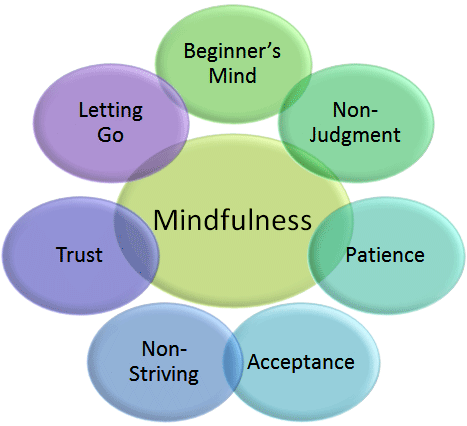A recent conversation with my naturopath drew my attention to Mindfulness-Based Stress Reduction (MBSR), a program developed in the 1970s by Professor Jon Kabat-Zinn at the University of Massachusetts Medical Center. It’s an 8-week workshop with weekly classes, homework, and an all-day retreat with instruction in mindfulness meditation, body scanning, and simple yoga postures. It’s based on the following tenets: beginner’s mind, non-judgment, patients, acceptance, non-striving, trust, and letting go.
My husband and I attended an orientation last Spring. I followed up with a quick read though The MBSR Program for Enhancing Health and Vitality by Linda Lehrhaupt and Petra Meibert, both certified trainers. While the authors make clear that a book is no substitute for the lived experience of a class, it provides a high-level summary of the course contents. I’m intrigued and may give the class a go.
Based on reading about how our brains and bodies work, I’ve learned how our mental activity impacts our brain circuitry and our physiology. When a situation elicits the “fight or flight” response, our bodies:
- Mobilize energy (glucose) in our bloodstreams to provide fuel for our muscles
- Elevate heart rates, blood pressure, and breathing to expedite delivery of fuel and oxygen to our cells
- Halt long-term “building projects” – e.g., growth, tissue repair, reproduction
- Boost immunity and blunt pain response
- Sharpen senses and improve memory
These physiological changes prove useful for responding to a short-term threat – e.g., running from a predator. They’re detrimental when activated over a prolonged period of time in response to sustained predatory conditions, chronic pain, mental anguish, and the like. MBSR provides the resources to tamp down the parts of our brain that activate anxiety/negativity and amp up the parts that promote resilience and well-being.
With mindfulness training, we can draw focus away from the particulars of a difficult situation (e.g., grid lock during the daily commute) and observe the way we relate to it on an emotional, intellectual, and behavioral level. We learn to recognize that the irritant plays a relatively minor role in our experience of stress; it’s the extra elements that we attach to it that escalate our response. With heightened sensitivity to our reactivity and our rumination, we can turn the dial down on stress while opening the door to options for self-management and coping.
Mindfulness goes beyond managing stress. The program also draws attention to all the ways in which we get caught up in thoughts and lose sight of what’s happening in the here and now. It strengthens our capacity to recognize the vitality of every moment – even when we’re doing chores! It helps us live in the present without getting caught up in a past that we can’t change or a future that has yet to occur.
Mindfulness also helps to calm the restless mind. Thoughts have power. When they get “stuck” in our minds, we can get caught up with them. But if we can become aware of them in a calm, friendly, non-judgmental manner – without identifying with them or giving them credence – they lose their capacity to exert a negative influence. They can just pass on through.
Mindfulness can help us improve relations with others. The core premise here is that we cannot connect meaningfully with others if we’re not connected to ourselves. When we’re in touch with our thoughts, feelings, wants, and needs, we’re more likely to communicate clearly and less likely to respond on auto-pilot. We’ll be grounded in the present moment and listen more attentively. We’ll pause before reacting, giving ourselves time to choose the appropriate thought, speech, or action. We’ll also notice when we’re involved with something or someone that does not prove forwarding for our lives.
Given the program’s longevity and span of influence, there has been quite a lot of research on its effectiveness… hence my interest in attending. I just need to figure out how I’ll get it to fit in my schedule!
